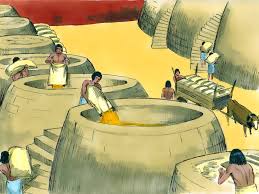Joseph Collected All the Money in Egypt
in Payment for the Grain
47: 13-14
Joseph collected all the money in Egypt in payment for the grain DIG: How severe were the next years of famine? To what do the people finally resort? What would have happened if Joseph just gave the grain away? Why was it important that the people of Egypt and the world buy it?
REFLECT: What happens to young adults who are given everything and not asked to work and buy things for themselves? Have you ever been out of work for an extended period of time? How did it make you feel? What does it do to your self-esteem?

There was no food, however, in the whole region because the famine was severe; both Egypt and Canaan were exhausted with hunger and they wasted away because of the famine (47:13). The reason that only Egypt and Canaan are mentioned is because they are the two geographical locations that are involved in our story. If Jacob had remained in Canaan with his family, they would have died. Grain had been stored in the land of Egypt, but the land was not producing grain anymore. Evidently the famine had spread all over Africa, because the Nile was not overflowing, which was necessary for Egypt’s crop production.728 As the days wore on, the famine continued. With no relief in sight, the people continued to buy their grain from Joseph’s storehouses. Though Yosef presumably asked a fair price for the grain, it was just a matter of time before they had spent all their savings on food.729
In the first stage (to see link click Kq – Joseph and the Famine), Joseph collected all the money that was to be found in Egypt and Canaan in payment for the grain they were buying (47:14a). The people bought their grain from the storehouses of Egypt. This was, and is to this day, an important principle. When any government merely gives its people food without working for it, that society eventually collapses. It destroys the spirit of its people and makes them dependent upon the state. Most of all, it robs them of their dignity. There is a spiritual principle built into the fabric of the world: If a man will not work, he shall not eat (Second Thessalonians 3:10b).
Though it may appear to some today that Joseph’s policies were repressive, it was clear in the ancient world that one paid one’s way so long as one had anything to part with – including, in the last resort one’s own freedom. Israelite law accepted this principle, while modifying it with the right to buy it back at a later time (Leviticus 25:25-55).730 Therefore, Yosef did not profit from the sale of grain. He was very ethical, and he brought the money to Pharaoh’s palace (47:14b).



Leave A Comment